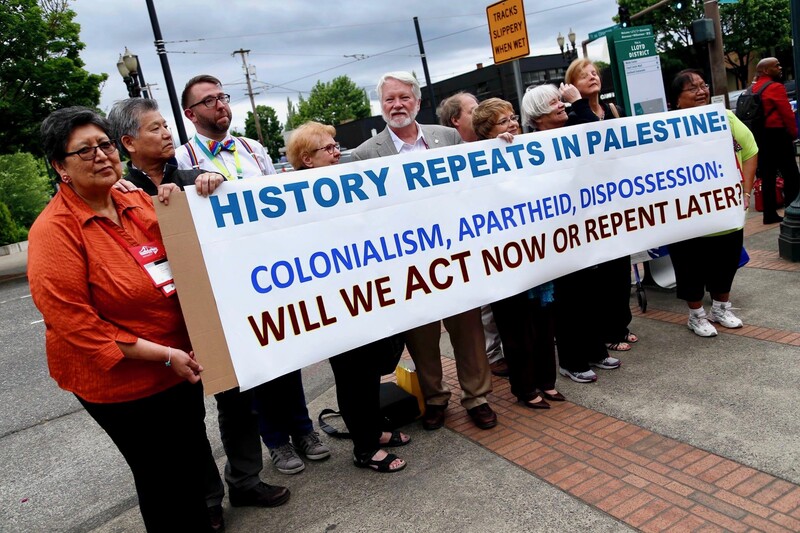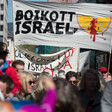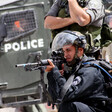Activism and BDS Beat 1 August 2017

Church-based activists are being urged by Palestinian Christian organizations not to be intimidated by Israel’s efforts to bully them into silence and inaction. (via Facebook)
Recent months have seen a host of efforts by churches to apply economic and political pressure in support of Palestinian rights.
They include the landslide vote in early July by the Mennonite Church USA to stop investments in occupation-linked corporations.
On 7 July, the World Communion of Reformed Churches called on the more than 80 million people in its member churches worldwide to examine their investments related to the situation in Palestine.
At its 26th General Council in the German city of Leipzig, the body urged leaders to heed a letter from Palestinian Christians calling for “costly solidarity.”
The letter, issued in June by the National Coalition of Christian Organizations in Palestine, asks that churches worldwide “speak in support of economic measures that pressure Israel to stop the occupation and that you support athletic, cultural and academic measures against Israel until it complies with international law and UN resolutions.”
The Palestinian Christian organizations urge fellow believers around the world to resist “Israel’s systemic assault” on nonviolent resistance and solidarity.
“We need brave women and men who are willing to stand in the forefront,” the letter states. “This is no time for shallow diplomacy Christians.”
Welcoming the growing support from churches around the world, the letter nonetheless expresses concern that “some churches have weakened their positions in the last 10 years as a result of this manipulating pressure.”
“Many still hide behind the cover of political neutrality,” the letter adds.
HP-free churches
Also in July, Friends of Sabeel North America announced that 17 US congregations had signed a pledge to boycott Hewlett-Packard due to its complicity in Israeli human rights violations against Palestinians.
Sabeel is a Palestinian Christian liberation theology organization based in Jerusalem, with affiliates around the world.
The boycott, divestment and sanctions (BDS) movement for Palestinian rights has long focused on HP for its use of biometric data technology at Israeli checkpoints and other systems used by the Israeli military, prisons and illegal settlements in occupied territory.
Congregations participating in the HP-Free Church campaign pledge to boycott the company’s computers, printers, inks and other products “until the company and all of its branches end contracts with Israel’s military and cease operations in the occupied West Bank.”
“We can’t continue to denounce occupation and participate in it – with our investments and our choices and our spending habits,” said Reverend David Grishaw-Jones, pastor of Peace United Church of Christ in Santa Cruz, California, in a press release from Friends of Sabeel North America. “Solidarity requires action.”
Methodist momentum
United Methodists for Kairos Response, a grassroots movement within the United Methodist Church, reported in July that 15 US regional Methodist bodies passed resolutions supporting the HP boycott.
They also encouraged investment in funds that screen other occupation-linked firms, opposed Israel’s abuse of children living under occupation, encouraged engagement with Palestinian Christians and committed to studying further divestment options.
While such regional grassroots efforts continue to gain momentum, Methodists previously voted down explicit divestment resolutions at national assemblies in 2012 and 2016.
Mennonite model
This contrasts with the Mennonite resolution which passed with a 98 percent majority following significant investment by both grassroots activists and church leaders to educate members.
A previous Mennonite resolution in 2015 had been deferred after missteps – such as scheduling Palestinian pastor Reverend Alex Awad to give a keynote address after the resolution was debated.
But Awad credits a church leadership willing to make a considerable financial investment, including salaries and expenses of those commissioned to educate congregations about the issue.
Speakers included Palestinian Christian leaders, rabbis affiliated with Jewish Voice for Peace and learning tours for more than 100 church representatives to visit the region firsthand.
Participation of leaders in the church’s key financial institutions who would eventually implement any investment screens was especially vital to the measure’s success.
“Regrettably, some Christian denominations are fast to make sympathetic resolutions in support of a just peace in the Middle East but are slow to invest in these resolutions with dollars and cents,” Awad writes in the magazine Sojourners. “Christians from all denominations should not only celebrate this landmark resolution, but also consider emulating the strategies Mennonites used.”
Media matters
While largely dismissive of the economic implications of church-based divestment, mainstream media are beginning to catch on to the symbolic impact of such efforts.
Reporting on the Mennonite vote, the Associated Press noted, “Although the economic impact is expected to be minimal, such votes are closely watched as a measure of views on Israel and the Palestinians from within the US, the Jewish state’s closest and most important ally.”
The AP acknowledged that BDS “has gained strength on US college campuses and elsewhere as a means of protesting Israeli policies and bringing moral pressure to end the occupation of Palestinian territories.”
CNBC also quoted Andre Gingerich Stoner, one of the resolution’s authors, who told the financial cable TV network that “the greater impact is the moral statement and the appeal that it’s making to others.”
Right to BDS
Some institutions stop short of endorsing BDS tactics, but they defend the right to engage in it. While at least 20 states have passed laws to penalize or stigmatize BDS efforts, nine Methodist regional bodies representing thousands of clergy and lay delegates and more than one million members have since 2016 approved resolutions defending the right to boycott and divest.
This reflects a mainstream position in defense of free speech; a Los Angeles Times editorial in July defended the right to engage in BDS as “a classic tool of peaceful political expression.”
Defending children
Also in July, the United Church of Christ voted overwhelmingly for a resolution demanding Israel end its systematic abuses of Palestinian children in military detention.
It urged its members to advocate for Palestinian children’s rights, potentially giving a big boost to efforts to pressure members of Congress to hold Israel accountable.
Days later, another denomination, the Disciples of Christ, passed a similar resolution.
“Classmates of mine have been detained at protests and even killed by Israeli soldiers,” Rachel Shomali, a young Palestinian Christian, testified at the Disciples of Christ conference. “Some of those detained are imprisoned for months without being properly charged, without access to trial, family and lawyers.”
Both resolutions call for Israel to be held accountable under the US Foreign Assistance Act, by withholding military aid from Israel due to its violent abuses of Palestinian children.
Textbook criticism
But as church-based solidarity increases, detractors are sticking to outdated arguments.
Objecting to the resolutions on Palestinian children, the American Jewish Committee trotted out the well-worn victim-blaming myth that Palestinian textbooks demonize Israel and incite Palestinian children to violence.
US government-sponsored research debunked this perennial Israel lobby talking point years ago.
While the American Jewish Committee accuses the resolutions of being “lopsided,” the Disciples of Christ acknowledge another kind of imbalance.
Their resolution states: “Justice and peace are impeded today by those who hide behind a false equivalency, refusing to acknowledge the gross imbalance of military and police power between Israelis and Palestinians, or refusing to recognize that the impact of occupation falls with greater weight on the occupied, not the occupier.”
Editor’s note: an earlier version of this article misstated the date on which the World Communion of Reformed Churches issued its message on Palestine.
Tags
- church activism
- church divestment
- World Communion of Reformed Churches
- National Coalition of Christian Organizations in Palestine
- Hewlett-Packard
- Friends of Sabeel North America
- United Methodist Church
- United Methodist Kairos Response
- Mennonite Church USA
- Alex Awad
- right to BDS
- textbooks
- United Church of Christ
- Disciples of Christ





Comments
Good initiatives, and any
Permalink Paranam Kid replied on
Good initiatives, and any counter by Israel or its surrogates can be deflected by claiming the Zionists' obsessive hate of Christians.
Date of WCRC resolution
Permalink Marthie Momberg replied on
Just a note to say that the decision by the World Communion of Reformed Churches was taken on 7 July 2017 and not on the 14th. For more, see marthiemombergblog.com/2017/07/16/world-protestant-body-christians-support-palestinian-rights/